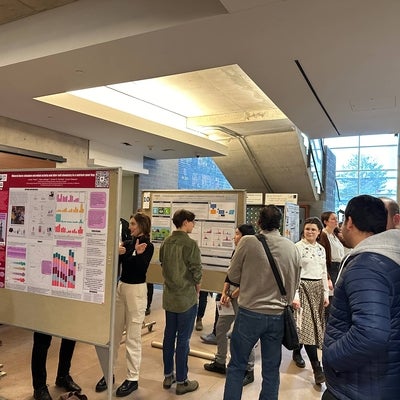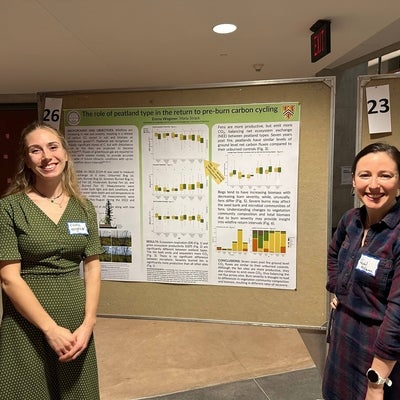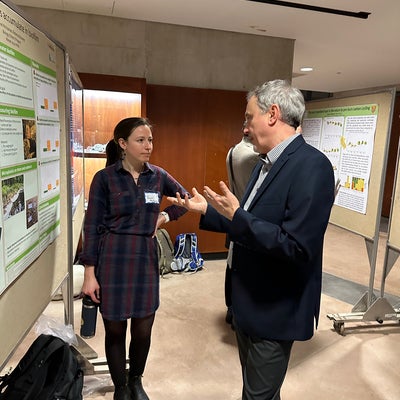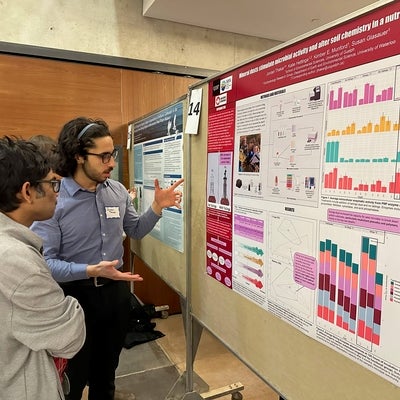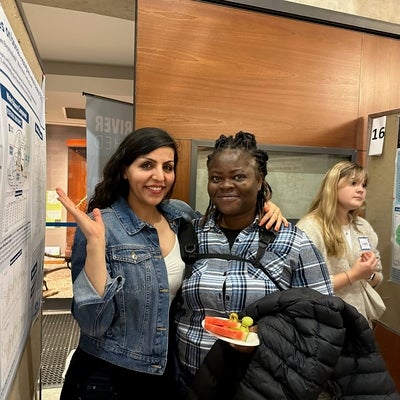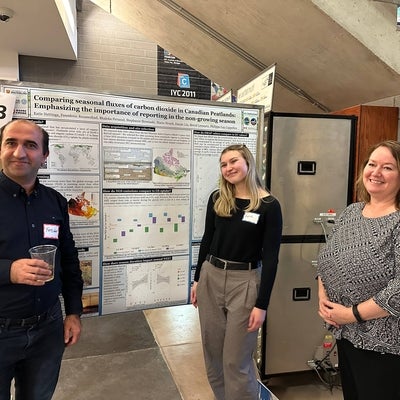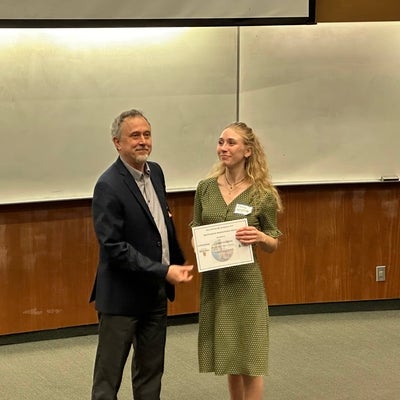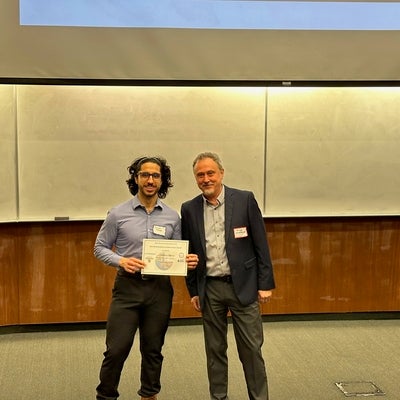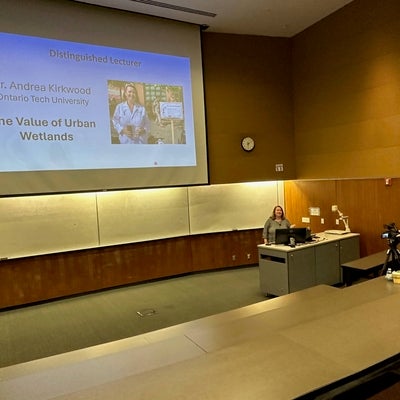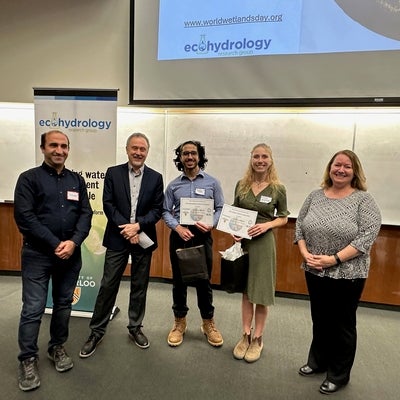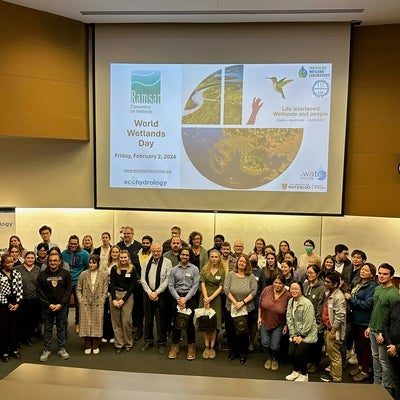Thank you to all who made this year's event a success!







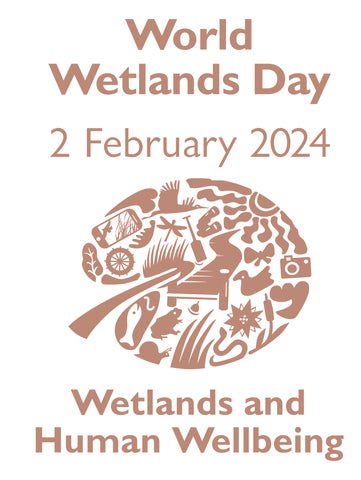
12th Annual World Wetlands Day at the University of Waterloo
About World Wetlands Day
World Wetlands Day (WWD) is celebrated each year on February 2nd, which marks the day when the Convention on Wetlands was adopted in 1971 in Ramsar, Iran. The Convention is an international government agreement acknowledging the importance of wetlands and plays a central role in the wise use and conservation of these critical ecosystems. To learn more about the Convention, visit: https://www.ramsar.org/.
World Wetlands Day 2024 Poster Session and General Registration
The University of Waterloo’s WWD event will be held in person in the EIT Foyer on Friday, February 2nd, 2024 from 4:00 to 7:00 pm EST.
The event will consist of a poster session and reception followed by a distinguished lecture by Dr. Andrea Kirkwood, entitled:
"The Value of Urban Wetlands"
from 6-7 pm in EIT 1015. The distinguished lecture will also be livestreamed for those unable to attend in person.
Prizes will be awarded to the best undergraduate and graduate posters.
We ask both poster presenters and attendees not presenting a poster to register to help us plan for the number of people attending.
Registration for this event is now closed. Thank you for your interest!

"The Value of Urban Wetlands"
Andrea Kirkwood completed a joint-honors degree in Environment and Resource Studies & Biology at the University of Waterloo, a master's degree in aquatic Ecology at McMaster University, and a doctoral degree in Environmental Microbiology at the University of Toronto. Andrea conducted postdoctoral studies at Oklahoma State University and the University of Calgary prior to joining the Faculty of Science at Ontario Tech University. Andrea currently holds a Research Excellence Chair in Urban Water and is a professor in the Biological Science (undergraduate) and Applied Bioscience (graduate) programs. In addition to research and teaching, Andrea is actively involved in community-based environmental stewardship initiatives.
Organizing Committee
Philippe Van Cappellen, Maria Strack, Fereidoun Rezanezhad, Rebecca Rooney, Stephanie Slowinski, Victoria Van Cappellen, Bhaleka Persaud, and Kayla Martin
Special thank you to the Science Outreach and the Water Institute for promoting the event.
Poster presentations
Amy Lacey - Investigating spatio-temporal patterns of contaminant deposition at ponds in the whooping crane nesting region (wood buffalo national park)
Amber Buston-White - Permafrost thaw induced changes to moisture distribution in subarctic peatlands
Katie Hettinga - Comparing seasonal fluxes of carbon dioxide in Canadian peatlands: emphasizing the importance of reporting in the non-growing season
Yinghao Song - The opportunities and challenges for pescatourism in Shizuoka and Miyagi prefectures in coastal Japan
Tyler Hampton - Using remote sensing to quantify wetland restoration potential in the prairie pothole region
Meredith Watson - Microplastics time trends in the grand river watershed
Amir Reshadi - Modeling of microplastic emission, transport, and retention in urban stormwater ponds
Oluwabamise Afolabi - Carbon cycle feedback of temperate forested wetlands under a changing climate
Samuel Abalansa - What is the fate of small-scale fisheries in the plasticene era
Jordan Li - Characterizing CH4 dynamics from small, restored wetlands in agricultural landscapes
Arisha Imran - Characterizing the importance of snowmelt on water balance of lakes in a northern freshwater delta
Xiaochuang Bu - Spatiotemporal dynamics of hydrogen peroxide in the hydrological-biogeochemical framework of riparian zones
Mackenize Ross - A review of at-risk turtle habitat selection and movement within Grundy Lake provincial park
Jordan Thakar - Mineral dusts shift bog chemistry, microbial community structure, and function- with implications for peat carbon fluxes.
Prince Joseph Amoah Agyapong - Transitioning from vulnerability to viability: adaptive responses to mining in Ankobra river small-scale fishery communities, Ghana.
Sheridan Hill - Field testing the oxygen isotope composition of sediment carbonate in the whooping crane nesting region to reconstruct pond water balance
Maryam Bayatvarkeshi - Influence of seismic lines on boreal ecosystem evapotranspiration
Harper Schmalz - Stormwater management pond function at cold temperatures
Rockwell Art Supplies - Wetlands action plan!
Serghei Bocaniov - Re-eutrophication of Lake Erie and its possible drivers: an insight from a phosphorus mass-balance model
Kasope Okubadejo - A web-based watershed delineation tool and its application to delineate 24,000 watersheds across Canada
Greeshma Prakash Sherly - Assessing the resilience of small-scale fishers in the face of climate change disasters
Jersey Allyson Fontz - Enhancing biotic resistance with native seed treatments
Md Abdus Sabur - Carbon budget of an urban stormwater pond: importance of riparian vegetation
Md Abdus Sabur - Constructing a hydrological model of streams in the GTA and calculating nutrient (p and N) loads for these streams
Emma Wegener - The role of peatland type in the return to pre-burn carbon cycling
Rachel Mcnamee - Microplastic accumulation in biofilm
Mitchell Elstone - Assessing water quality and stormwater management pond function over one year
Murray Lister - Collaborative management within small-scale fisheries
Christina Bao - Assessing changes in peatland plant community functions following seismic line disturbance
Erin Griffiths - Enzymatic degradation of polyethylene terephthalate (PET) using hic cutinase
Mackenzie Jones - Water, wildlife and the world: A synthesis of trends in wildlife ecohydrology research.
Laura Anderson - Paleolimnological assessment of climate-driven changes in shallow ponds within the whooping crane nesting region, NWT Canada.
Nazia Tabassum - Impacts of linear disturbances on Canadian wetlands
Danielle Green - Quantifying and characterizing the biodegradability of dissolved organic carbon in freshwater systems: A method evaluation study
